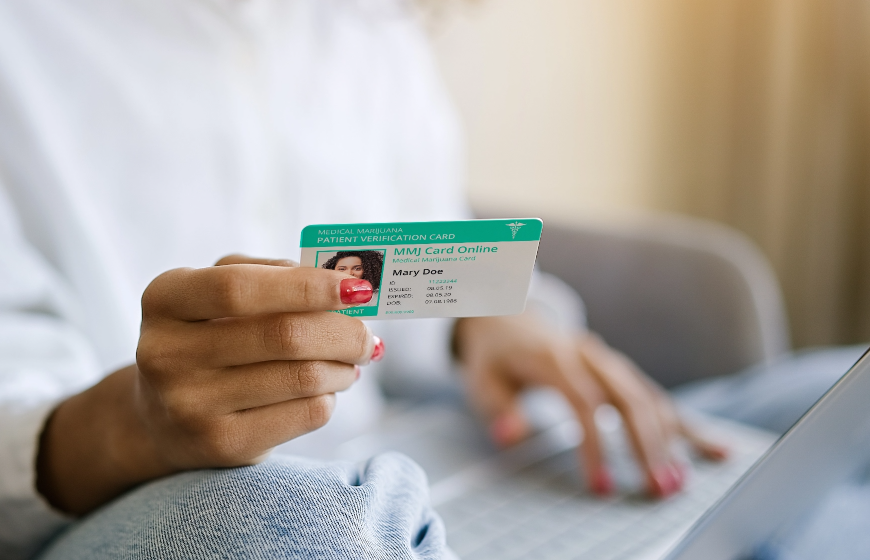3 Easy Steps: How to Apply for a Connecticut Medical Marijuana Card

Register with MMJ Card Online
First, fill out the submission form above to schedule an online appointment with a Connecticut state-registered physician. MMJ Card Online gets patients in touch with registered CT medical marijuana doctors, and in many instances, approval is completed in just minutes.

Speak with a Licensed MMJ Doctor Online
During a brief online consultation (usually no more than 15 minutes), the physician will ask about your medical condition and review your records. They will determine whether MMJ is a viable option for you. Please note that in many cases, doctors expect patients to have tried more conventional treatment options first. In most instances, the medical professional will decide whether you’re a suitable candidate for medical marijuana immediately after the consultation. If you’re successful, the doctor will provide you with a written certification.

Receive Your Official CT MMJ Approval and Start Buying Meds!
The application process through MMJ Card Online’s telemedicine service providers and trusted physician partners is $149 – and if you’re not approved for a Connecticut medical marijuana card, you get your money back! Online approvals are typically completed in under 20 minutes, and once you’ve completed the consultation, simply wait for an official email from the Connecticut Department of Administrative Services (DAS) Business Network, and you’ll be ready to visit a licensed CT cannabis dispensary and start buying meds!
During your online telemedicine consultation, you will be asked to provide a valid form of government-issued identification. Your doctor may also ask you for information that is required to access your medical records. Once submitted to the state, your application will be reviewed by the Connecticut Department of Administrative Services (DAS) Business Network. If anything is incomplete, the application will be sent back. (One of the major benefits of applying for a Connecticut medical marijuana card through MMJ Card Online is our doctor’s take care of the paperwork and application submission process for you). If approved, you will be added to the CT Medical Marijuana Registry, and will receive your Connecticut medical marijuana card in the mail, generally within 15 business days of being approved. *(Additional fees with the state of Connecticut’s MMJ Registry may be necessary in order to fully process your application. See the FAQ section below for more information).
How to Apply for a Medical Marijuana Card in Connecticut (Step-by-Step Guide)
- Fill out the submission form at the top of this page.
- Speak with a registered CT physician for your MMJ card consultation.
- Provide basic information and a government-issued ID so your application can be submitted to the Connecticut Medical Marijuana Program.
- Pay the $149 telemedicine consultation fee.
- Register online with the CT Medical Marijuana Registry (this will be taken care of by the doctor who does your consultation).
- Receive your official Connecticut MMJ card in the mail! (Physical cards may take up to three weeks to be delivered, but you will receive an email from the MMCP that you can print off and use temporarily until your card arrives)
Connecticut Medical Marijuana Card Qualifying Conditions
You’re eligible for medical marijuana in CT if you tick the following boxes:
- A Connecticut resident
- Aged 18+
- Has a qualifying medical condition (we have a list below)
Patient Qualifying Conditions
Connecticut’s list of qualifying medical conditions is among the longest in the United States. It includes the following:
- Cancer
- Epilepsy
- MS
- Ulcerative colitis
- Muscular dystrophy
- Sickle cell disease
- Crohn’s disease
- Tourette syndrome
- Parkinson’s disease
- Neuropathic facial pain
- HIV/AIDS
- Cerebral palsy
- PTSD
- Cystic fibrosis
- Rheumatoid arthritis
If you have a condition not listed above, don’t panic. There are many more qualifying conditions, a full list of which is available on the official DCP website.
General Guidelines
Now that you know the medical marijuana card application process, it’s time to investigate further details relating to the MMJ program.
Medical Marijuana Card Renewal in Connecticut
The MMJ program in Connecticut is slightly different from that of other states regarding the validity of your card. In other states, your card is valid for a year from when the relevant authority approves your application. In CT, your card is also valid for a year but is calculated from the day you receive the written doctor’s certification. Therefore, you need to complete the application process as soon as possible.
We recommend beginning the renewal process several weeks before your medical marijuana card expires to ensure you retain the legal protection provided by the MMJ card. The process involves getting your doctor to confirm you’re still under their care. Otherwise, you must get a new written certification from a different physician. If you use the same doctor, they must complete the three certifications at the end of the form.
You must also provide evidence that you’re still a Connecticut resident, complete the renewal form on the DCP portal, provide an updated picture, and pay the registration fee.
Caregiver Rules
MMJ patients in Connecticut can use a primary caregiver aged 18+ who is also a state resident. This individual agrees to manage the patient’s well-being concerning the palliative use of medical marijuana. You can’t serve as a caregiver in CT if you have been convicted of violating any law relating to controlled substances.
Patients must register their chosen caregiver on the DCP application. The caregiver must have a valid primary phone number and email address. Next, they need to create a DAS Business Network account, answer several questions and pay a $25 registration fee.
A Brief History of Cannabis in Connecticut
In June 2011, Governor Dannel Malloy put his signature on legislation that decriminalized the possession of small amounts of marijuana. Just one year later, he signed a medical marijuana program into law. After a failed attempt to legalize adult-use marijuana in 2018, Governor Ned Lamont signed Senate Bill 1201 into law in June 2021, allowing the sale, purchase, and possession of recreational cannabis in Connecticut. Sales began in January 2023, although initially, adults aged 21+ were limited to 7 grams of usable marijuana per transaction to ensure that MMJ patients have enough of a supply.
Connecticut Medical Marijuana Laws and Rules
The new rules surrounding recreational marijuana in CT mean that adults aged 21+ can possess up to 1.5 ounces of the substance in public and five ounces in a locked container. You face a civil infraction charge if caught with more than five ounces. A second offense is a misdemeanor that could lead to three months in prison.
The cultivation of up to three mature and three immature plants is also illegal, and you’ll receive a written warning if caught. A third offense is a misdemeanor and could result in a 30-day jail term. It is a felony to sell any amount of marijuana without the requisite license. If convicted, you could spend up to seven years in prison.
From July 2023, recreational users will be permitted to grow up to six plants at home or 12 plants in a household with two or more adults.
What Types of Cannabis Products Can I Purchase in CT?
MMJ patients in Connecticut have a wide range of products to choose from, including:
- Dry flower
- Pre-rolls
- Tinctures
- Vape products
- Edibles
- Pre-rolls
- Extracts
How Much Cannabis Can I Buy & Possess?
MMJ cardholders in Connecticut can buy up to five ounces per month and possess the same amount. Until recently, the limit was just 2.5 ounces, but the DCP increased it with the advent of recreational marijuana sales.
Where Can I LEGALLY Purchase MMJ in Connecticut?
At present, 18 dispensaries sell marijuana in Connecticut, and a few have become hybrid stores offering services to MMJ and recreational users. Please note that you can only use your medicine in a private residence.
Can I Take My MMJ to a Different State?
No. It remains illegal to bring any federally prohibited substance across state lines regardless of its legality in a state. Furthermore, Connecticut doesn’t accept out-of-state medical marijuana cards, although a CT MMJ card may be accepted in other states.
Can I Cultivate Marijuana in Connecticut with my MMJ Card?
Yes. MMJ cardholders in CT can grow up to three mature and three immature plants at home. If a household has two or more qualifying patients, the maximum amount increases to six mature and six immature plants.
FAQ About Getting an MMJ Card in Connecticut
Although the state program may take up to 30 days to process your application, it is generally quicker.
In the unlikely event that the doctor provided by our partners doesn’t provide certification, you will receive a full refund.
The application fee is $100, and a doctor’s consultation can cost up to $250. However, you’ll find that this cost is significantly reduced when you use our providers.
Yes, applicants aged 17 and under can apply with the permission of a parent or legal guardian and require a caregiver. However, they require certification from two physicians, one of whom must be their regular doctor. Furthermore, minors can only get a medical marijuana card if they have one of the following qualifying conditions:
- Cerebral palsy
- Cystic fibrosis
- Osteogenesis imperfecta
- Irreversible spinal cord injury with an objective neurological indication of intractable spasticity
- Tourette syndrome (when conventional treatments don’t work)
- Terminal illness
- Intractable neuropathic pain that doesn’t respond to traditional treatment methods
- Severe epilepsy
- Muscular dystrophy
- Uncontrolled intractable seizure disorder